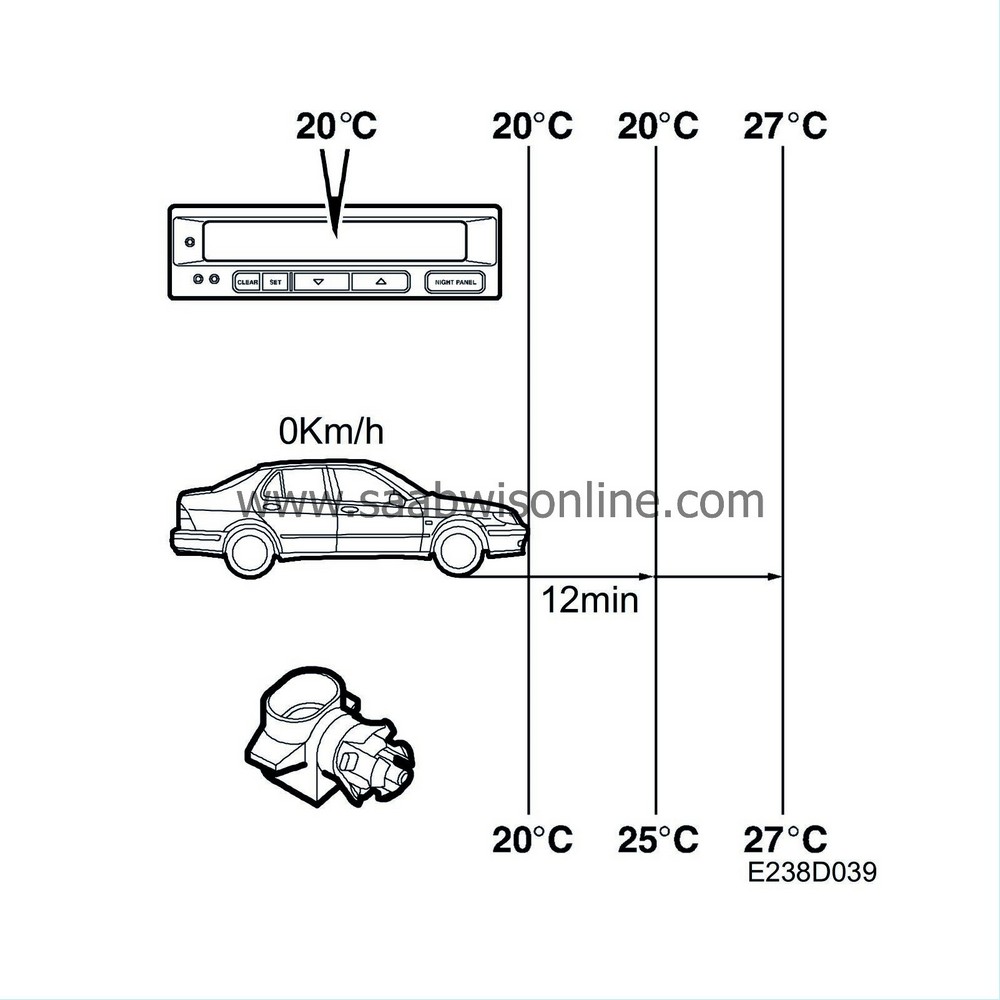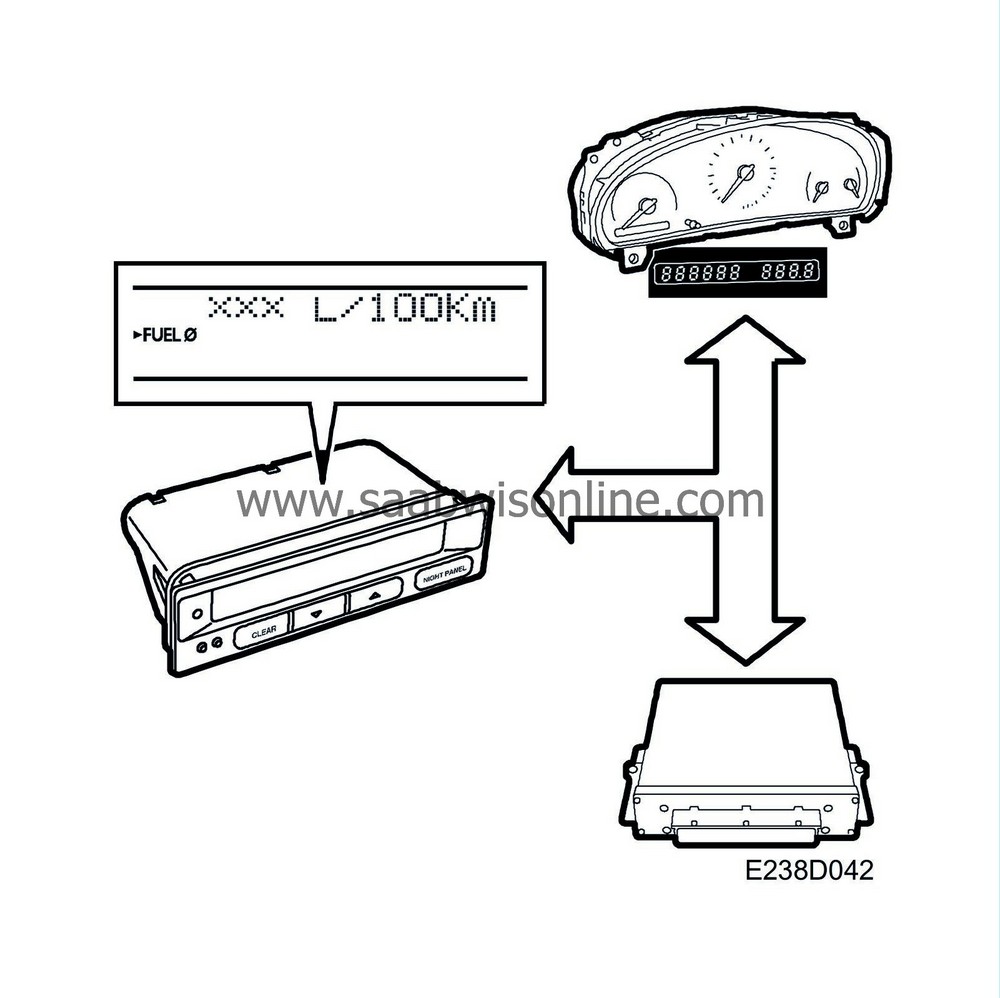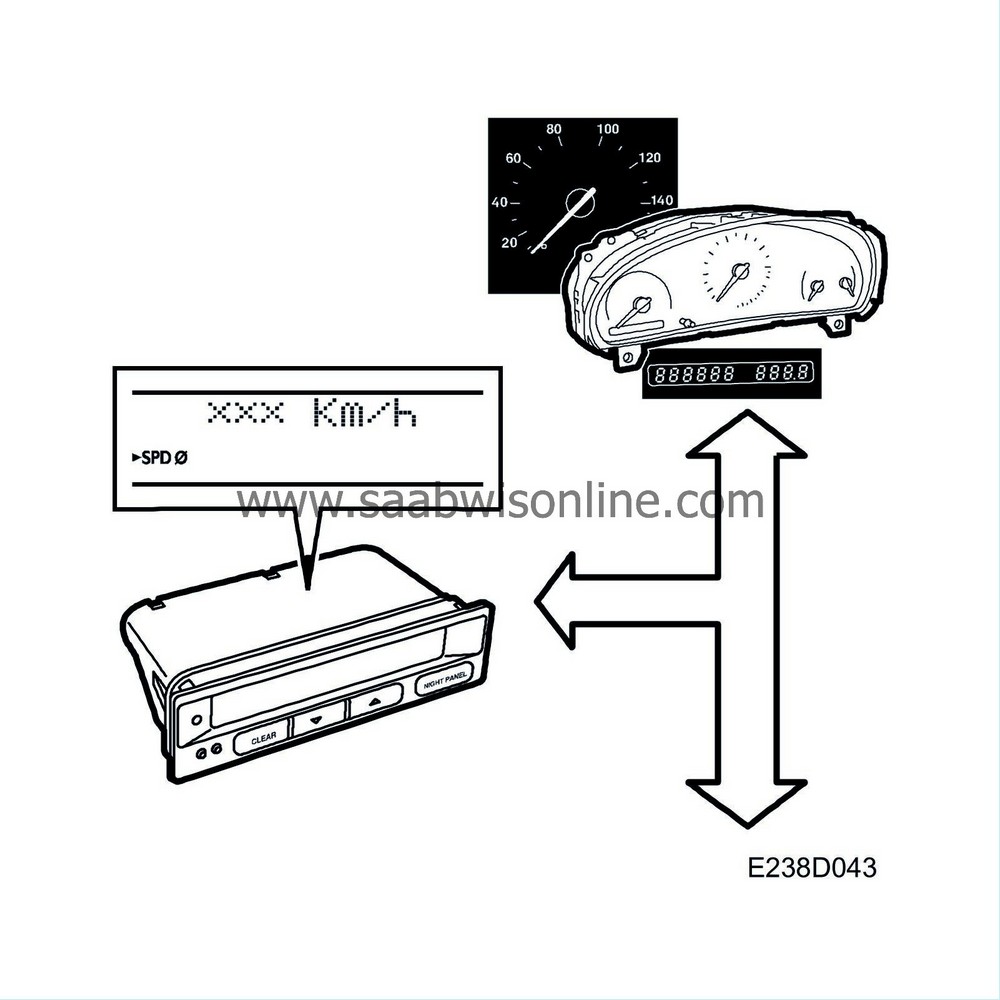Trip computer functions SID 1/SID 2.
| Trip computer functions SID 1/SID 2. |
| Outside temperature |
The current outside temperature will be shown in the SID display if the TEMP function is selected or the temperature warning function is activated. The outside temperature will then be shown automatically. Information on the outside temperature comes from the sensor in the front spoiler.
A temperature warning function is built into the SID and works as follows:
If the temperature falls from a higher temperature down to +3°C (37°F) or rises from a lower temperature to -3°C (26°F), the outside temperature is automatically displayed irrespective of the SID unit display setting.
This display remains until another function is selected.
To avoid the effect of radiant heat, the temperature sensor reading is updated differently depending on whether the outside temperature is rising or falling, and is speed-dependent.
The reading is updated as follows:
| • |
+1°C (1.8°F) every 6 minutes at speeds below 30 km/h.
|
|
| • |
+1°C (1.8°F) every 30 seconds at speeds above 30 km/h.
|
|
| • |
-1°C (1.8°F) every 2.5 seconds.
|
|

If the engine is turned off, the current outside temperature reading is stored in the SID. The SID calculates for how long the engine has been switched off. When the ignition is turned on again, the SID displays the stored outside temperature reading from ignition OFF if the time since turning off the engine is:
| • |
less than 12 minutes
|
|
If the engine has been turned off for more than 12 minutes, the current outside temperature reading from the sensor is shown.
Information on the outside temperature is sent as bus information, unit °C/°F (-40 +50°C), (-40 122°F).
| DTE (distance on remaining fuel). |

To calculate how far the car will run on the fuel remaining in the tank, the SID uses information on:
| • |
Fuel level, unit litres (bus information from MIU).
|
|
| • |
Odometer reading, unit km (bus information from MIU).
|
|
| • |
Fuel consumed since starting, unit ml (bus information from Trionic).
|
|
| • |
Coolant temperature, unit °C (bus information from Trionic).
|
|
The calculated value is updated every 16 seconds. To avoid rapid changes in the value, no update is carried out when starting from cold or if car speed is below 5 km/h.
When the function is reset, “x x x” km (miles) appears on the SID unit display. The distance then shown (DTE) is calculated internally using the value of 1 l/10 km.
| FUEL (average fuel consumption) |


The average fuel consumption is calculated using the following information:
| • |
Fuel consumed since starting, unit ml (bus information from Trionic).
|
|
| • |
Odometer reading, unit km, miles (bus information from MIU).
|
|
The display range is 0 to 99.9 litres/100 km, MPG Imp or MPG.
The calculated value is updated every 4 seconds from the last manual memory reset. Every 500 km, both the distance and the fuel consumption are divided by 2 so that the value is not influenced too much by “old” consumption figures.
On reset, both parameters are set to 0, “- - -” appears on the display. When a distance of 100 m has been covered, a new figure will be shown.
| SPD (average speed), SID 1 |

The average speed is calculated using the time information (clock) and the following information:
| • |
Odometer reading, unit km, miles (bus information from MIU).
|
|
| • |
Speed, km/h, mph (bus information from MIU).
|
|
The display range is 0 to 250 km/h (0-155 mph) and the reading is updated every 4 seconds from the previous reset.
On zeroing, all parameters are set to 0, “- - -” km/h (miles/h) appears on the display. When a distance of 100 m has been covered, a new figure will be shown.
| SPD (average speed), SID 2 |
The average speed is calculated in the same way as for SID 1 above.
Calculations in SID 2.
The SID calculates the ratio between DIST, ARRIV and SPD. To carry out these calculations, the value in DIST must be greater than 0.If an arrival time is then programmed into ARRIV the SID will show the calculated average speed, or if a desired average speed is programmed in SPD, the SID will show the estimated arrival time in ARRIV.
If the calculation is made when the car is running, the calculated value is replaced by the correct figure after 10 seconds. If the calculation is made with the car stationary, the calculated value is replaced by the correct figure as soon as the car is driven.



